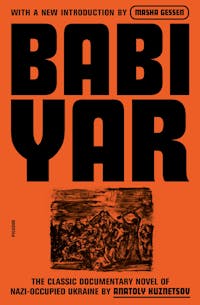Babi Yar
A Document in the Form of a Novel; New, Complete, Uncensored Version
 Download image
Download image
ISBN10: 1250883830
ISBN13: 9781250883834
Trade Paperback
496 Pages
$20.00
“I wonder if we shall ever understand that the most precious thing in this world is a man’s life and his freedom? Or is there still more barbarism ahead? With these questions I think I shall bring this book to an end. I wish you peace. And freedom.”
At the age of twelve, Anatoly Kuznetsov experienced the Nazi invasion of Ukraine, and soon began keeping a diary of the brutal occupation of Kiev that followed. Years later, he combined those notebooks with other survivors’ memories to create a classic work of documentary witness in the form of a novel. When Babi Yar was first published in a Soviet magazine in 1966, it became a literary sensation, not least for its powerful and unprecedented narratives of the Nazi massacre of the city’s Jews, and later Roma, prisoners of war, and other victims, at the Babi Yar ravine—one of the largest mass killings of the Holocaust. After Kuznetsov defected to Great Britain in 1969, he republished the book in a new edition that included extensive passages censored by the Soviets, along with his later reflections.
In its fully realized form, Babi Yar is a classic of Holocaust and World War II testimony. With sustained immediacy, it relates a scrappy but principled boy’s day-to-day fight to survive and provide for his family. He dodges bullets and avoids transport to Germany, befriends black market horse dealers and pre-revolutionary aristocrats, wonders at the pomp of the Nazi’s opera performances, overhears his mother and grandparents debate the merits of German versus Soviet rule, collects grenades, digs hiding places, and confronts the moral dilemmas of assisting neighbors or looting stores—all the while hearing the constant hum of bullets at the Babi Yar ravine nearby.
In a bravura feat of reporting, he tells the story of what happened at Babi Yar—from the deceptive roundup of the city’s Jews and execution of the national soccer team, to the memories of the site’s few survivors and the story of a daring escape. The book’s once-censored passages explore the Soviet effort to hide the realities of the massacre and other facts about wartime that the regime did not want discussed.
In the manner of Elie Wiesel’s Night or The Diary of Anne Frank, here is a book that tells some of the most uncomfortable truths of the past century—and the most essential.
Reviews
Praise for Babi Yar
"By the end of this raw, direct, meticulously assembled collection of testimony, there is no choice but to recognize, and to bow before, the assertion of its opening sentence: 'This book contains nothing but the truth.'"—Sam Sacks, The Wall Street Journal
"[A] masterpiece . . . Babi Yar [is] every bit the peer of the canonical works of witness [such as] Anne Frank's diary . . . Wiesel's Night . . . Solzhenityn's Gulag Archipelago . . . [The book] reminds me in some ways of Huckleberry Finn . . . Painfully relevant again, Babi Yar might at last find the wide readership it deserves . . . In telling the truth, the book also exposes lies of the past and present."—George Packer, The Atlantic


